Contemporary Issues in Accounting: IFRS Implementation Challenges
VerifiedAdded on 2023/06/07
|12
|2611
|121
Report
AI Summary
This report examines contemporary issues in accounting, focusing on the challenges of implementing International Financial Reporting Standards (IFRS) in both emerging and developed economies. It explores the contextual issues that hinder effective IFRS adoption, such as differing accounting practices, cultural resistance, and the complexity of initial implementation. The report analyzes the comparison of financial reports, using Domino’s Pizza Enterprise Ltd. as a case study, and discusses the convergence of IFRS and its potential to improve financial reporting quality. The benefits of uniform accounting standards, including enhanced comparability, consistency, and the ability to assess financial data across sectors, are highlighted. The report also emphasizes the importance of timely and reliable financial information for investors and stakeholders. The study concludes that the harmonization of accounting standards through IFRS can lead to more uniform and high-quality financial reporting, though challenges remain in achieving global convergence. The report emphasizes the need for qualified professionals, independent auditors, and strict regulatory oversight to ensure successful IFRS implementation.
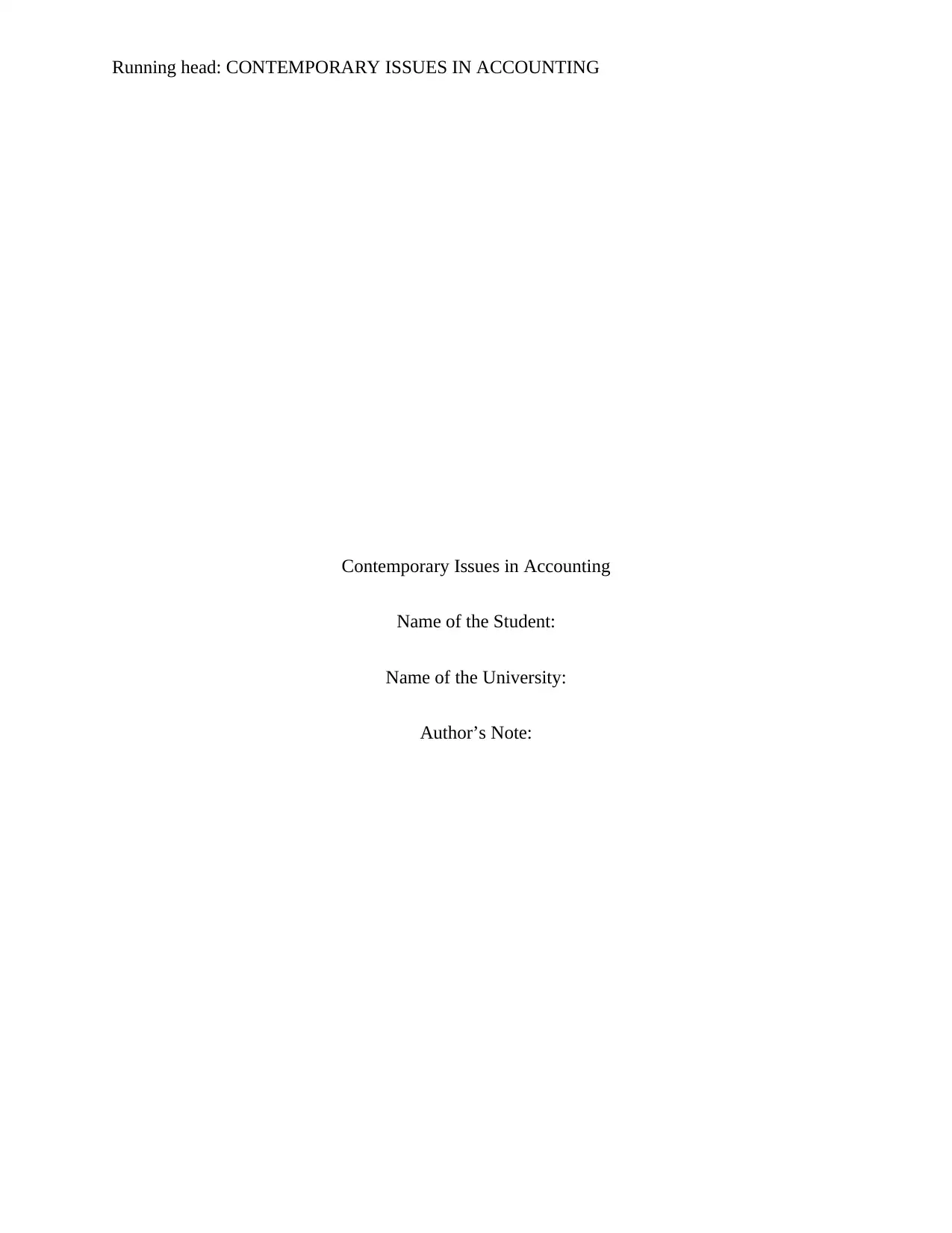
Running head: CONTEMPORARY ISSUES IN ACCOUNTING
Contemporary Issues in Accounting
Name of the Student:
Name of the University:
Author’s Note:
Contemporary Issues in Accounting
Name of the Student:
Name of the University:
Author’s Note:
Paraphrase This Document
Need a fresh take? Get an instant paraphrase of this document with our AI Paraphraser
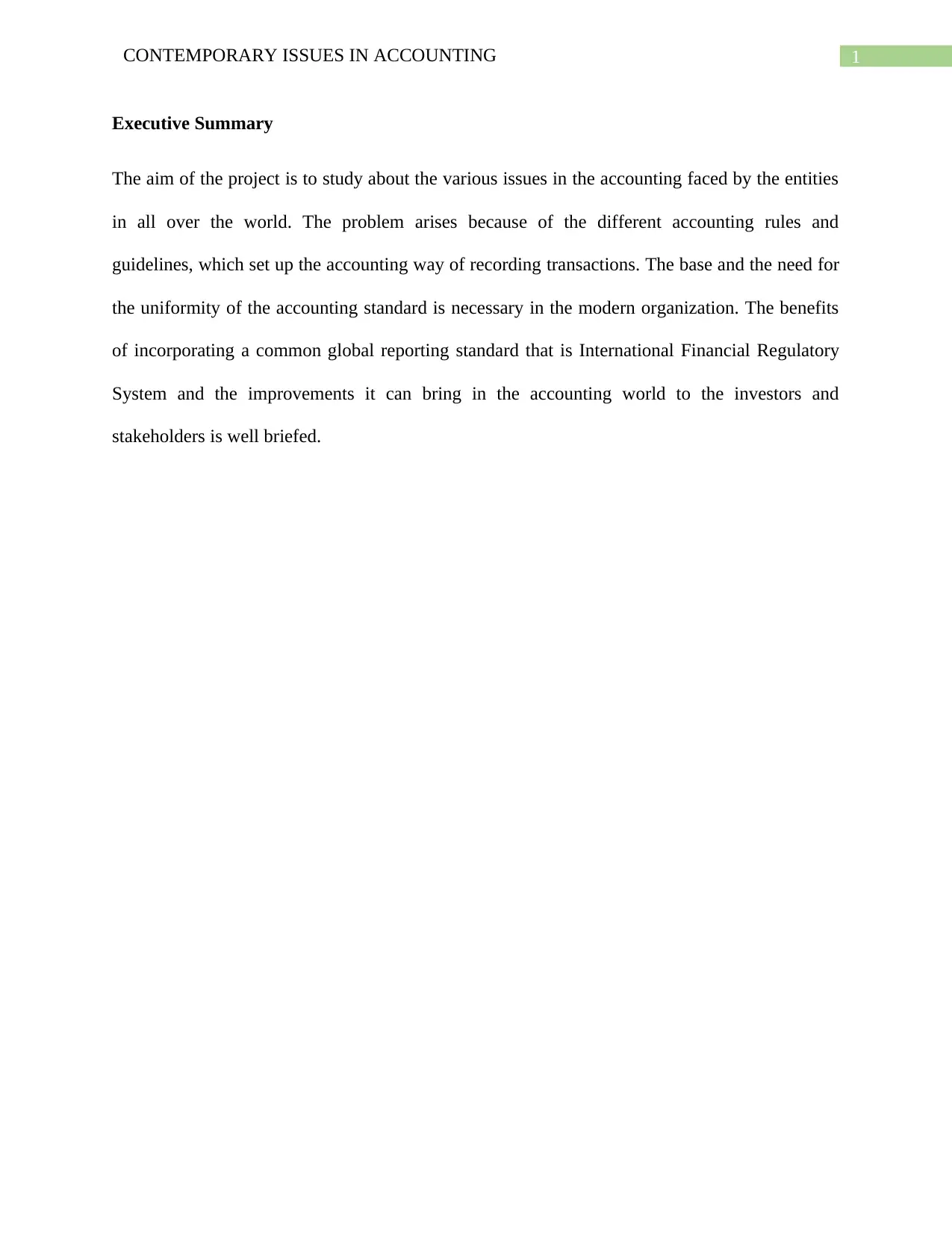
1CONTEMPORARY ISSUES IN ACCOUNTING
Executive Summary
The aim of the project is to study about the various issues in the accounting faced by the entities
in all over the world. The problem arises because of the different accounting rules and
guidelines, which set up the accounting way of recording transactions. The base and the need for
the uniformity of the accounting standard is necessary in the modern organization. The benefits
of incorporating a common global reporting standard that is International Financial Regulatory
System and the improvements it can bring in the accounting world to the investors and
stakeholders is well briefed.
Executive Summary
The aim of the project is to study about the various issues in the accounting faced by the entities
in all over the world. The problem arises because of the different accounting rules and
guidelines, which set up the accounting way of recording transactions. The base and the need for
the uniformity of the accounting standard is necessary in the modern organization. The benefits
of incorporating a common global reporting standard that is International Financial Regulatory
System and the improvements it can bring in the accounting world to the investors and
stakeholders is well briefed.
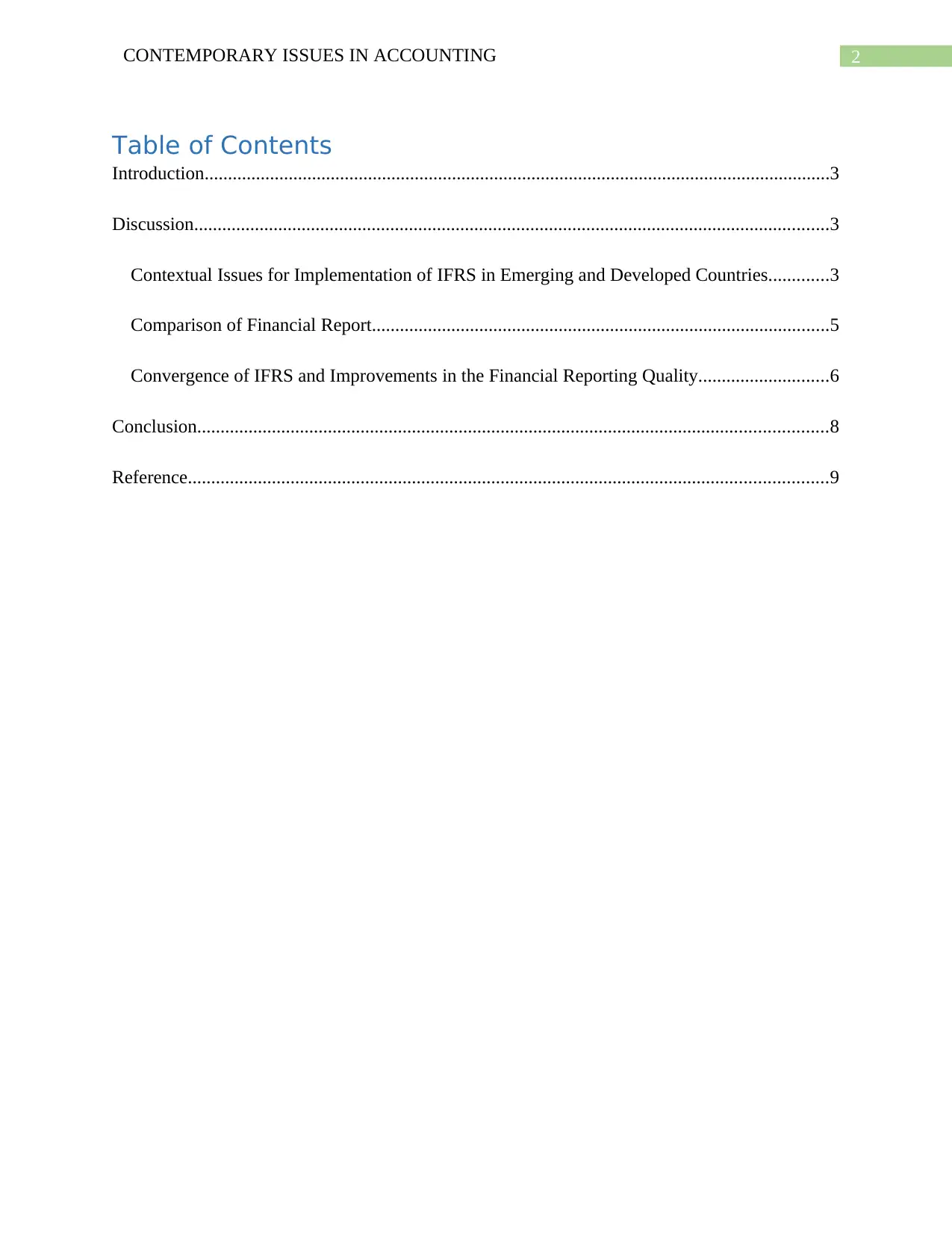
2CONTEMPORARY ISSUES IN ACCOUNTING
Table of Contents
Introduction......................................................................................................................................3
Discussion........................................................................................................................................3
Contextual Issues for Implementation of IFRS in Emerging and Developed Countries.............3
Comparison of Financial Report..................................................................................................5
Convergence of IFRS and Improvements in the Financial Reporting Quality............................6
Conclusion.......................................................................................................................................8
Reference.........................................................................................................................................9
Table of Contents
Introduction......................................................................................................................................3
Discussion........................................................................................................................................3
Contextual Issues for Implementation of IFRS in Emerging and Developed Countries.............3
Comparison of Financial Report..................................................................................................5
Convergence of IFRS and Improvements in the Financial Reporting Quality............................6
Conclusion.......................................................................................................................................8
Reference.........................................................................................................................................9
⊘ This is a preview!⊘
Do you want full access?
Subscribe today to unlock all pages.

Trusted by 1+ million students worldwide
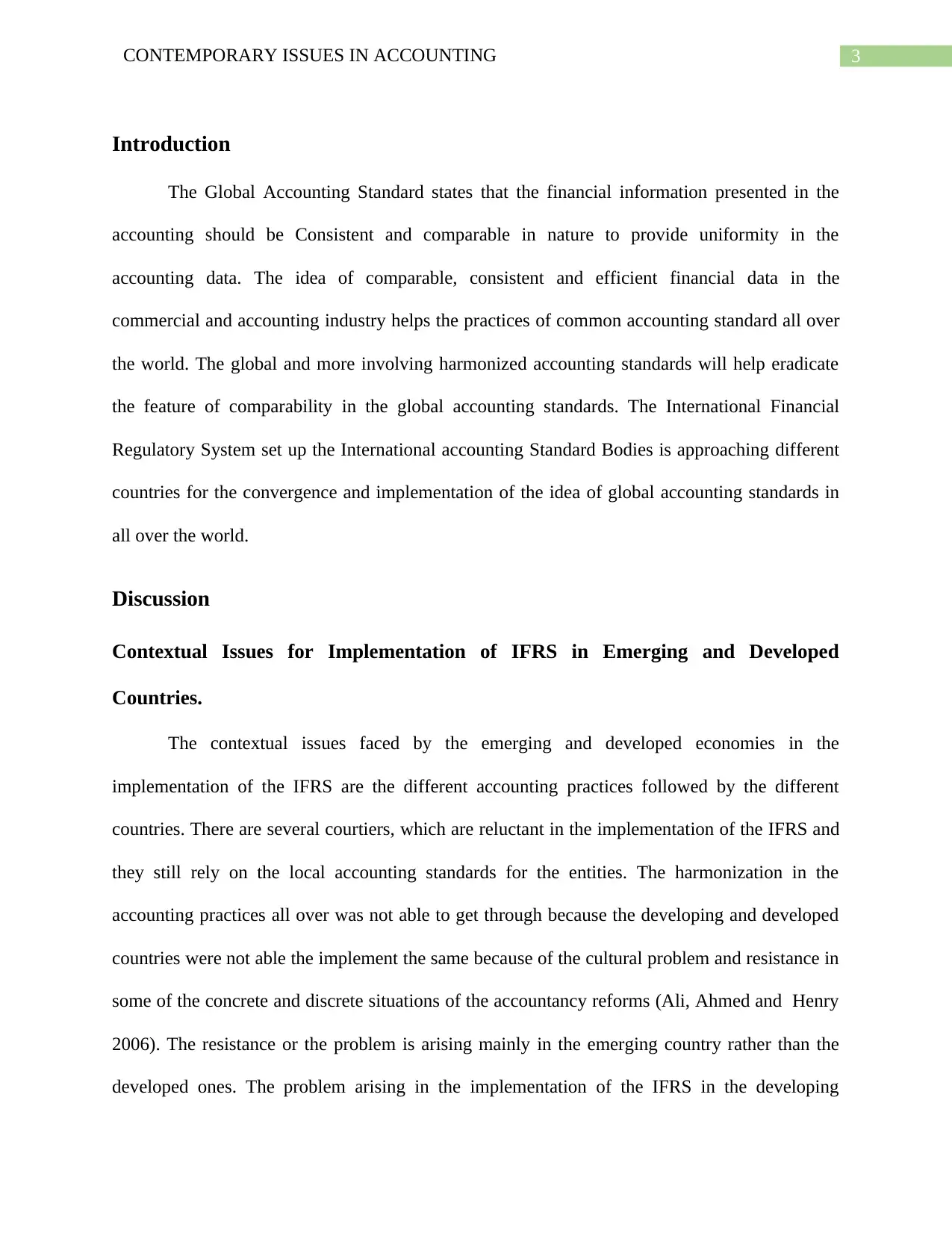
3CONTEMPORARY ISSUES IN ACCOUNTING
Introduction
The Global Accounting Standard states that the financial information presented in the
accounting should be Consistent and comparable in nature to provide uniformity in the
accounting data. The idea of comparable, consistent and efficient financial data in the
commercial and accounting industry helps the practices of common accounting standard all over
the world. The global and more involving harmonized accounting standards will help eradicate
the feature of comparability in the global accounting standards. The International Financial
Regulatory System set up the International accounting Standard Bodies is approaching different
countries for the convergence and implementation of the idea of global accounting standards in
all over the world.
Discussion
Contextual Issues for Implementation of IFRS in Emerging and Developed
Countries.
The contextual issues faced by the emerging and developed economies in the
implementation of the IFRS are the different accounting practices followed by the different
countries. There are several courtiers, which are reluctant in the implementation of the IFRS and
they still rely on the local accounting standards for the entities. The harmonization in the
accounting practices all over was not able to get through because the developing and developed
countries were not able the implement the same because of the cultural problem and resistance in
some of the concrete and discrete situations of the accountancy reforms (Ali, Ahmed and Henry
2006). The resistance or the problem is arising mainly in the emerging country rather than the
developed ones. The problem arising in the implementation of the IFRS in the developing
Introduction
The Global Accounting Standard states that the financial information presented in the
accounting should be Consistent and comparable in nature to provide uniformity in the
accounting data. The idea of comparable, consistent and efficient financial data in the
commercial and accounting industry helps the practices of common accounting standard all over
the world. The global and more involving harmonized accounting standards will help eradicate
the feature of comparability in the global accounting standards. The International Financial
Regulatory System set up the International accounting Standard Bodies is approaching different
countries for the convergence and implementation of the idea of global accounting standards in
all over the world.
Discussion
Contextual Issues for Implementation of IFRS in Emerging and Developed
Countries.
The contextual issues faced by the emerging and developed economies in the
implementation of the IFRS are the different accounting practices followed by the different
countries. There are several courtiers, which are reluctant in the implementation of the IFRS and
they still rely on the local accounting standards for the entities. The harmonization in the
accounting practices all over was not able to get through because the developing and developed
countries were not able the implement the same because of the cultural problem and resistance in
some of the concrete and discrete situations of the accountancy reforms (Ali, Ahmed and Henry
2006). The resistance or the problem is arising mainly in the emerging country rather than the
developed ones. The problem arising in the implementation of the IFRS in the developing
Paraphrase This Document
Need a fresh take? Get an instant paraphrase of this document with our AI Paraphraser
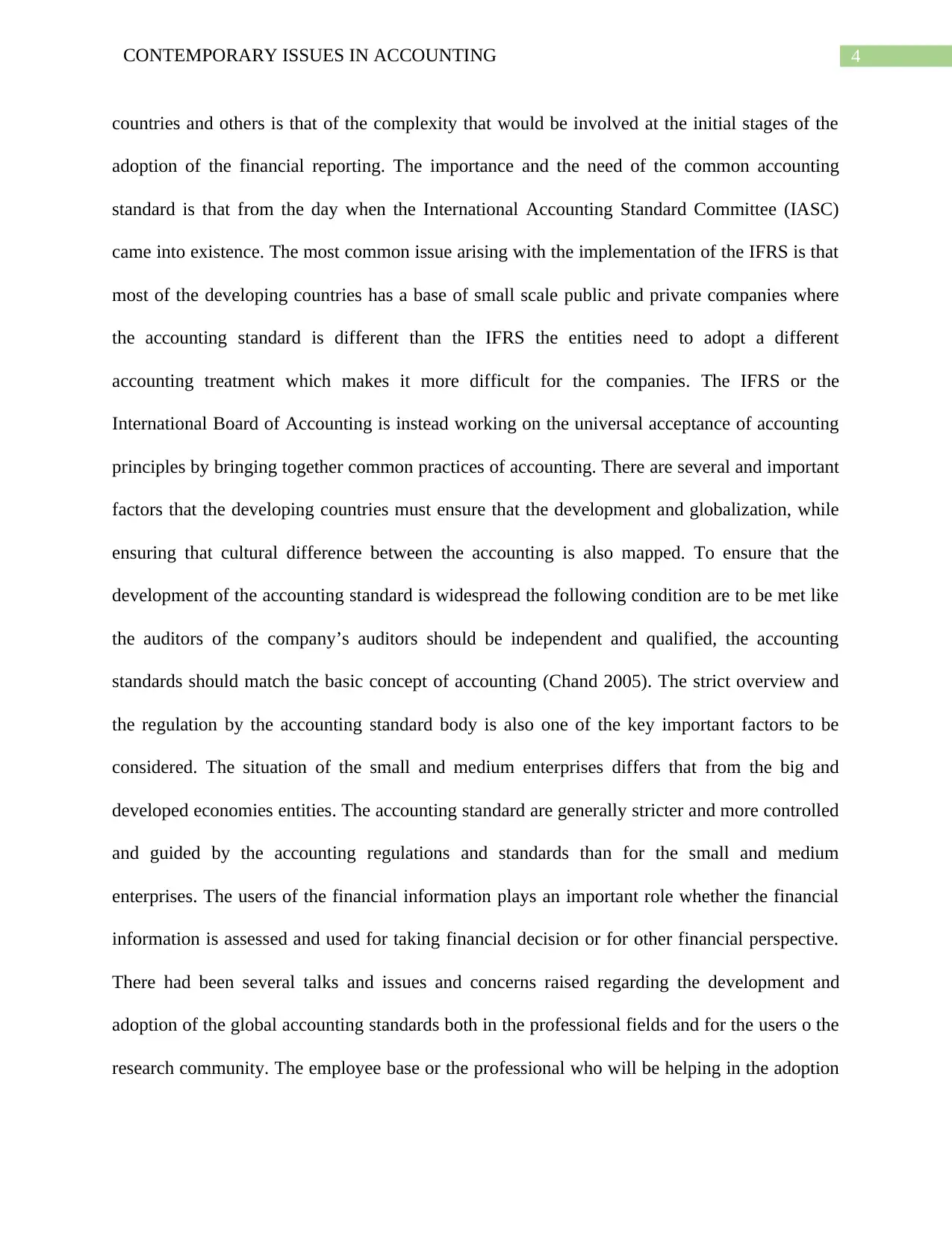
4CONTEMPORARY ISSUES IN ACCOUNTING
countries and others is that of the complexity that would be involved at the initial stages of the
adoption of the financial reporting. The importance and the need of the common accounting
standard is that from the day when the International Accounting Standard Committee (IASC)
came into existence. The most common issue arising with the implementation of the IFRS is that
most of the developing countries has a base of small scale public and private companies where
the accounting standard is different than the IFRS the entities need to adopt a different
accounting treatment which makes it more difficult for the companies. The IFRS or the
International Board of Accounting is instead working on the universal acceptance of accounting
principles by bringing together common practices of accounting. There are several and important
factors that the developing countries must ensure that the development and globalization, while
ensuring that cultural difference between the accounting is also mapped. To ensure that the
development of the accounting standard is widespread the following condition are to be met like
the auditors of the company’s auditors should be independent and qualified, the accounting
standards should match the basic concept of accounting (Chand 2005). The strict overview and
the regulation by the accounting standard body is also one of the key important factors to be
considered. The situation of the small and medium enterprises differs that from the big and
developed economies entities. The accounting standard are generally stricter and more controlled
and guided by the accounting regulations and standards than for the small and medium
enterprises. The users of the financial information plays an important role whether the financial
information is assessed and used for taking financial decision or for other financial perspective.
There had been several talks and issues and concerns raised regarding the development and
adoption of the global accounting standards both in the professional fields and for the users o the
research community. The employee base or the professional who will be helping in the adoption
countries and others is that of the complexity that would be involved at the initial stages of the
adoption of the financial reporting. The importance and the need of the common accounting
standard is that from the day when the International Accounting Standard Committee (IASC)
came into existence. The most common issue arising with the implementation of the IFRS is that
most of the developing countries has a base of small scale public and private companies where
the accounting standard is different than the IFRS the entities need to adopt a different
accounting treatment which makes it more difficult for the companies. The IFRS or the
International Board of Accounting is instead working on the universal acceptance of accounting
principles by bringing together common practices of accounting. There are several and important
factors that the developing countries must ensure that the development and globalization, while
ensuring that cultural difference between the accounting is also mapped. To ensure that the
development of the accounting standard is widespread the following condition are to be met like
the auditors of the company’s auditors should be independent and qualified, the accounting
standards should match the basic concept of accounting (Chand 2005). The strict overview and
the regulation by the accounting standard body is also one of the key important factors to be
considered. The situation of the small and medium enterprises differs that from the big and
developed economies entities. The accounting standard are generally stricter and more controlled
and guided by the accounting regulations and standards than for the small and medium
enterprises. The users of the financial information plays an important role whether the financial
information is assessed and used for taking financial decision or for other financial perspective.
There had been several talks and issues and concerns raised regarding the development and
adoption of the global accounting standards both in the professional fields and for the users o the
research community. The employee base or the professional who will be helping in the adoption
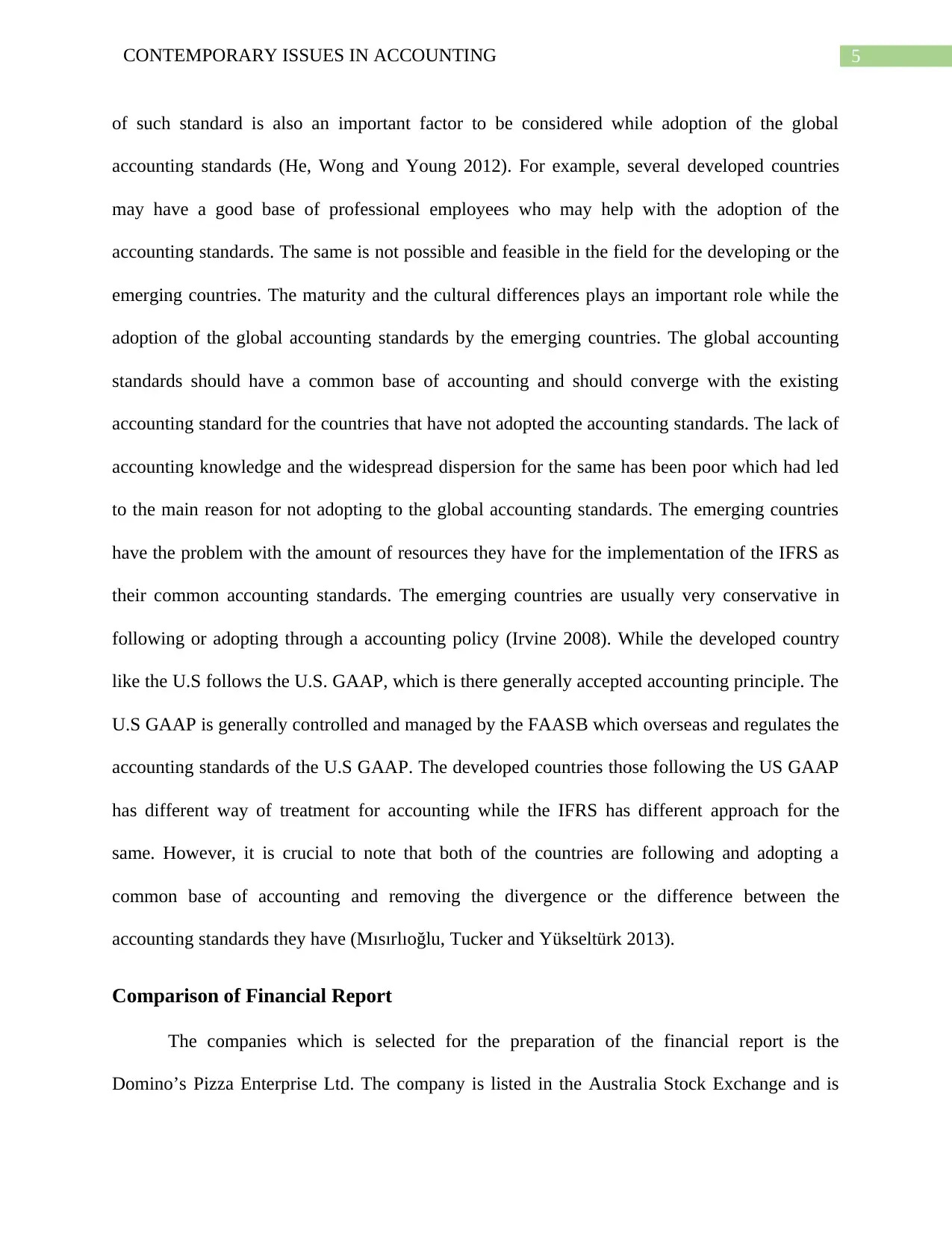
5CONTEMPORARY ISSUES IN ACCOUNTING
of such standard is also an important factor to be considered while adoption of the global
accounting standards (He, Wong and Young 2012). For example, several developed countries
may have a good base of professional employees who may help with the adoption of the
accounting standards. The same is not possible and feasible in the field for the developing or the
emerging countries. The maturity and the cultural differences plays an important role while the
adoption of the global accounting standards by the emerging countries. The global accounting
standards should have a common base of accounting and should converge with the existing
accounting standard for the countries that have not adopted the accounting standards. The lack of
accounting knowledge and the widespread dispersion for the same has been poor which had led
to the main reason for not adopting to the global accounting standards. The emerging countries
have the problem with the amount of resources they have for the implementation of the IFRS as
their common accounting standards. The emerging countries are usually very conservative in
following or adopting through a accounting policy (Irvine 2008). While the developed country
like the U.S follows the U.S. GAAP, which is there generally accepted accounting principle. The
U.S GAAP is generally controlled and managed by the FAASB which overseas and regulates the
accounting standards of the U.S GAAP. The developed countries those following the US GAAP
has different way of treatment for accounting while the IFRS has different approach for the
same. However, it is crucial to note that both of the countries are following and adopting a
common base of accounting and removing the divergence or the difference between the
accounting standards they have (Mısırlıoğlu, Tucker and Yükseltürk 2013).
Comparison of Financial Report
The companies which is selected for the preparation of the financial report is the
Domino’s Pizza Enterprise Ltd. The company is listed in the Australia Stock Exchange and is
of such standard is also an important factor to be considered while adoption of the global
accounting standards (He, Wong and Young 2012). For example, several developed countries
may have a good base of professional employees who may help with the adoption of the
accounting standards. The same is not possible and feasible in the field for the developing or the
emerging countries. The maturity and the cultural differences plays an important role while the
adoption of the global accounting standards by the emerging countries. The global accounting
standards should have a common base of accounting and should converge with the existing
accounting standard for the countries that have not adopted the accounting standards. The lack of
accounting knowledge and the widespread dispersion for the same has been poor which had led
to the main reason for not adopting to the global accounting standards. The emerging countries
have the problem with the amount of resources they have for the implementation of the IFRS as
their common accounting standards. The emerging countries are usually very conservative in
following or adopting through a accounting policy (Irvine 2008). While the developed country
like the U.S follows the U.S. GAAP, which is there generally accepted accounting principle. The
U.S GAAP is generally controlled and managed by the FAASB which overseas and regulates the
accounting standards of the U.S GAAP. The developed countries those following the US GAAP
has different way of treatment for accounting while the IFRS has different approach for the
same. However, it is crucial to note that both of the countries are following and adopting a
common base of accounting and removing the divergence or the difference between the
accounting standards they have (Mısırlıoğlu, Tucker and Yükseltürk 2013).
Comparison of Financial Report
The companies which is selected for the preparation of the financial report is the
Domino’s Pizza Enterprise Ltd. The company is listed in the Australia Stock Exchange and is
⊘ This is a preview!⊘
Do you want full access?
Subscribe today to unlock all pages.

Trusted by 1+ million students worldwide
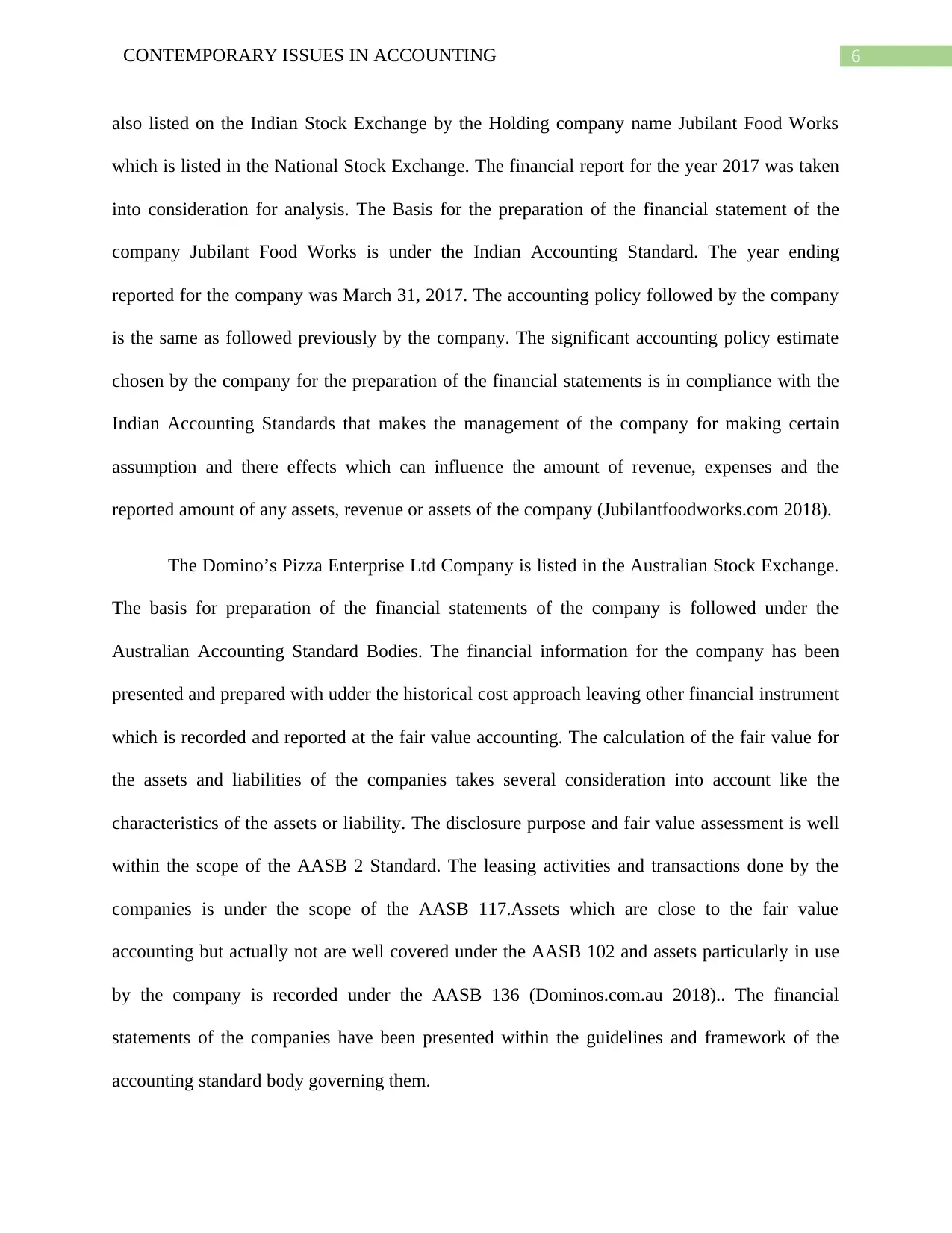
6CONTEMPORARY ISSUES IN ACCOUNTING
also listed on the Indian Stock Exchange by the Holding company name Jubilant Food Works
which is listed in the National Stock Exchange. The financial report for the year 2017 was taken
into consideration for analysis. The Basis for the preparation of the financial statement of the
company Jubilant Food Works is under the Indian Accounting Standard. The year ending
reported for the company was March 31, 2017. The accounting policy followed by the company
is the same as followed previously by the company. The significant accounting policy estimate
chosen by the company for the preparation of the financial statements is in compliance with the
Indian Accounting Standards that makes the management of the company for making certain
assumption and there effects which can influence the amount of revenue, expenses and the
reported amount of any assets, revenue or assets of the company (Jubilantfoodworks.com 2018).
The Domino’s Pizza Enterprise Ltd Company is listed in the Australian Stock Exchange.
The basis for preparation of the financial statements of the company is followed under the
Australian Accounting Standard Bodies. The financial information for the company has been
presented and prepared with udder the historical cost approach leaving other financial instrument
which is recorded and reported at the fair value accounting. The calculation of the fair value for
the assets and liabilities of the companies takes several consideration into account like the
characteristics of the assets or liability. The disclosure purpose and fair value assessment is well
within the scope of the AASB 2 Standard. The leasing activities and transactions done by the
companies is under the scope of the AASB 117.Assets which are close to the fair value
accounting but actually not are well covered under the AASB 102 and assets particularly in use
by the company is recorded under the AASB 136 (Dominos.com.au 2018).. The financial
statements of the companies have been presented within the guidelines and framework of the
accounting standard body governing them.
also listed on the Indian Stock Exchange by the Holding company name Jubilant Food Works
which is listed in the National Stock Exchange. The financial report for the year 2017 was taken
into consideration for analysis. The Basis for the preparation of the financial statement of the
company Jubilant Food Works is under the Indian Accounting Standard. The year ending
reported for the company was March 31, 2017. The accounting policy followed by the company
is the same as followed previously by the company. The significant accounting policy estimate
chosen by the company for the preparation of the financial statements is in compliance with the
Indian Accounting Standards that makes the management of the company for making certain
assumption and there effects which can influence the amount of revenue, expenses and the
reported amount of any assets, revenue or assets of the company (Jubilantfoodworks.com 2018).
The Domino’s Pizza Enterprise Ltd Company is listed in the Australian Stock Exchange.
The basis for preparation of the financial statements of the company is followed under the
Australian Accounting Standard Bodies. The financial information for the company has been
presented and prepared with udder the historical cost approach leaving other financial instrument
which is recorded and reported at the fair value accounting. The calculation of the fair value for
the assets and liabilities of the companies takes several consideration into account like the
characteristics of the assets or liability. The disclosure purpose and fair value assessment is well
within the scope of the AASB 2 Standard. The leasing activities and transactions done by the
companies is under the scope of the AASB 117.Assets which are close to the fair value
accounting but actually not are well covered under the AASB 102 and assets particularly in use
by the company is recorded under the AASB 136 (Dominos.com.au 2018).. The financial
statements of the companies have been presented within the guidelines and framework of the
accounting standard body governing them.
Paraphrase This Document
Need a fresh take? Get an instant paraphrase of this document with our AI Paraphraser
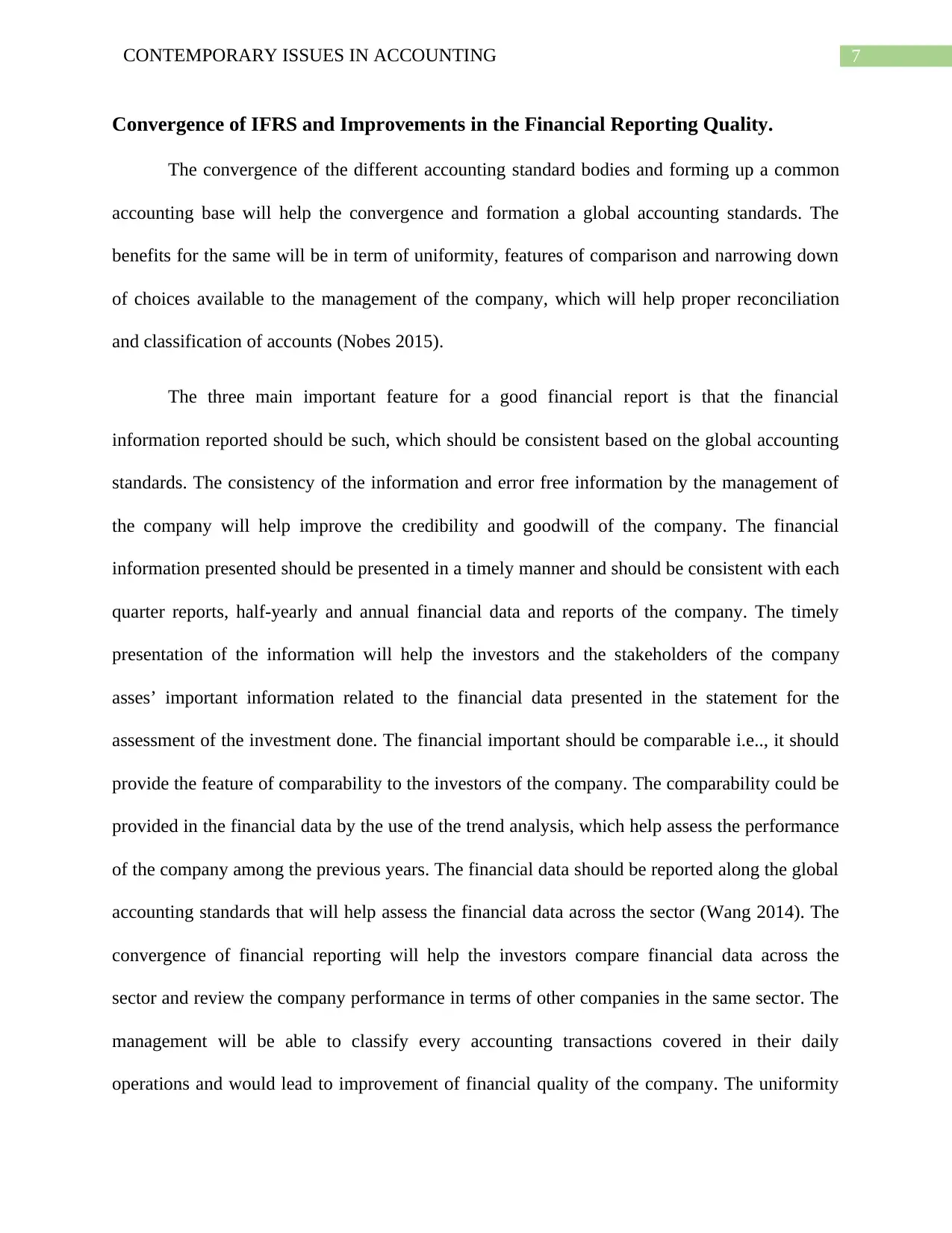
7CONTEMPORARY ISSUES IN ACCOUNTING
Convergence of IFRS and Improvements in the Financial Reporting Quality.
The convergence of the different accounting standard bodies and forming up a common
accounting base will help the convergence and formation a global accounting standards. The
benefits for the same will be in term of uniformity, features of comparison and narrowing down
of choices available to the management of the company, which will help proper reconciliation
and classification of accounts (Nobes 2015).
The three main important feature for a good financial report is that the financial
information reported should be such, which should be consistent based on the global accounting
standards. The consistency of the information and error free information by the management of
the company will help improve the credibility and goodwill of the company. The financial
information presented should be presented in a timely manner and should be consistent with each
quarter reports, half-yearly and annual financial data and reports of the company. The timely
presentation of the information will help the investors and the stakeholders of the company
asses’ important information related to the financial data presented in the statement for the
assessment of the investment done. The financial important should be comparable i.e.., it should
provide the feature of comparability to the investors of the company. The comparability could be
provided in the financial data by the use of the trend analysis, which help assess the performance
of the company among the previous years. The financial data should be reported along the global
accounting standards that will help assess the financial data across the sector (Wang 2014). The
convergence of financial reporting will help the investors compare financial data across the
sector and review the company performance in terms of other companies in the same sector. The
management will be able to classify every accounting transactions covered in their daily
operations and would lead to improvement of financial quality of the company. The uniformity
Convergence of IFRS and Improvements in the Financial Reporting Quality.
The convergence of the different accounting standard bodies and forming up a common
accounting base will help the convergence and formation a global accounting standards. The
benefits for the same will be in term of uniformity, features of comparison and narrowing down
of choices available to the management of the company, which will help proper reconciliation
and classification of accounts (Nobes 2015).
The three main important feature for a good financial report is that the financial
information reported should be such, which should be consistent based on the global accounting
standards. The consistency of the information and error free information by the management of
the company will help improve the credibility and goodwill of the company. The financial
information presented should be presented in a timely manner and should be consistent with each
quarter reports, half-yearly and annual financial data and reports of the company. The timely
presentation of the information will help the investors and the stakeholders of the company
asses’ important information related to the financial data presented in the statement for the
assessment of the investment done. The financial important should be comparable i.e.., it should
provide the feature of comparability to the investors of the company. The comparability could be
provided in the financial data by the use of the trend analysis, which help assess the performance
of the company among the previous years. The financial data should be reported along the global
accounting standards that will help assess the financial data across the sector (Wang 2014). The
convergence of financial reporting will help the investors compare financial data across the
sector and review the company performance in terms of other companies in the same sector. The
management will be able to classify every accounting transactions covered in their daily
operations and would lead to improvement of financial quality of the company. The uniformity
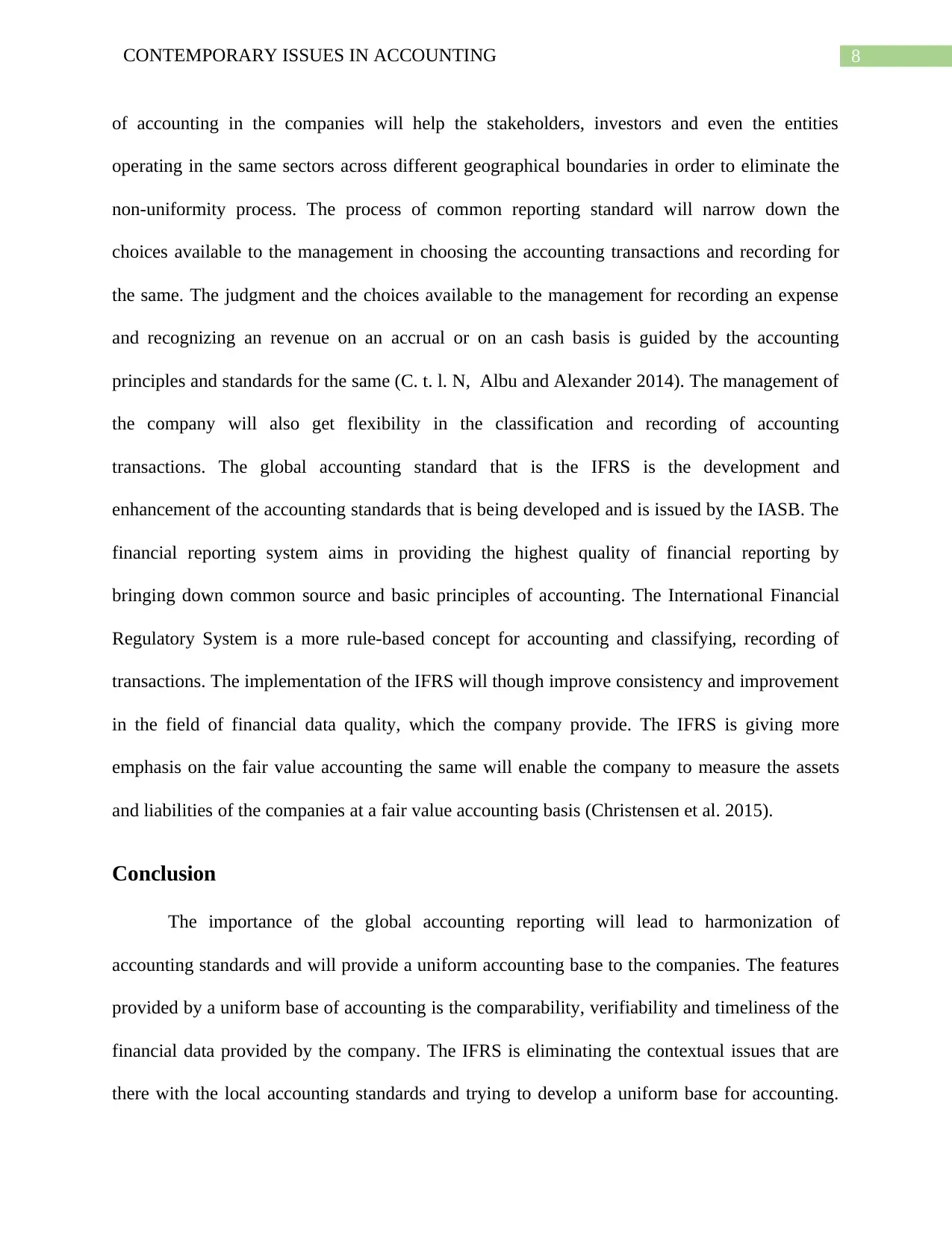
8CONTEMPORARY ISSUES IN ACCOUNTING
of accounting in the companies will help the stakeholders, investors and even the entities
operating in the same sectors across different geographical boundaries in order to eliminate the
non-uniformity process. The process of common reporting standard will narrow down the
choices available to the management in choosing the accounting transactions and recording for
the same. The judgment and the choices available to the management for recording an expense
and recognizing an revenue on an accrual or on an cash basis is guided by the accounting
principles and standards for the same (C. t. l. N, Albu and Alexander 2014). The management of
the company will also get flexibility in the classification and recording of accounting
transactions. The global accounting standard that is the IFRS is the development and
enhancement of the accounting standards that is being developed and is issued by the IASB. The
financial reporting system aims in providing the highest quality of financial reporting by
bringing down common source and basic principles of accounting. The International Financial
Regulatory System is a more rule-based concept for accounting and classifying, recording of
transactions. The implementation of the IFRS will though improve consistency and improvement
in the field of financial data quality, which the company provide. The IFRS is giving more
emphasis on the fair value accounting the same will enable the company to measure the assets
and liabilities of the companies at a fair value accounting basis (Christensen et al. 2015).
Conclusion
The importance of the global accounting reporting will lead to harmonization of
accounting standards and will provide a uniform accounting base to the companies. The features
provided by a uniform base of accounting is the comparability, verifiability and timeliness of the
financial data provided by the company. The IFRS is eliminating the contextual issues that are
there with the local accounting standards and trying to develop a uniform base for accounting.
of accounting in the companies will help the stakeholders, investors and even the entities
operating in the same sectors across different geographical boundaries in order to eliminate the
non-uniformity process. The process of common reporting standard will narrow down the
choices available to the management in choosing the accounting transactions and recording for
the same. The judgment and the choices available to the management for recording an expense
and recognizing an revenue on an accrual or on an cash basis is guided by the accounting
principles and standards for the same (C. t. l. N, Albu and Alexander 2014). The management of
the company will also get flexibility in the classification and recording of accounting
transactions. The global accounting standard that is the IFRS is the development and
enhancement of the accounting standards that is being developed and is issued by the IASB. The
financial reporting system aims in providing the highest quality of financial reporting by
bringing down common source and basic principles of accounting. The International Financial
Regulatory System is a more rule-based concept for accounting and classifying, recording of
transactions. The implementation of the IFRS will though improve consistency and improvement
in the field of financial data quality, which the company provide. The IFRS is giving more
emphasis on the fair value accounting the same will enable the company to measure the assets
and liabilities of the companies at a fair value accounting basis (Christensen et al. 2015).
Conclusion
The importance of the global accounting reporting will lead to harmonization of
accounting standards and will provide a uniform accounting base to the companies. The features
provided by a uniform base of accounting is the comparability, verifiability and timeliness of the
financial data provided by the company. The IFRS is eliminating the contextual issues that are
there with the local accounting standards and trying to develop a uniform base for accounting.
⊘ This is a preview!⊘
Do you want full access?
Subscribe today to unlock all pages.

Trusted by 1+ million students worldwide
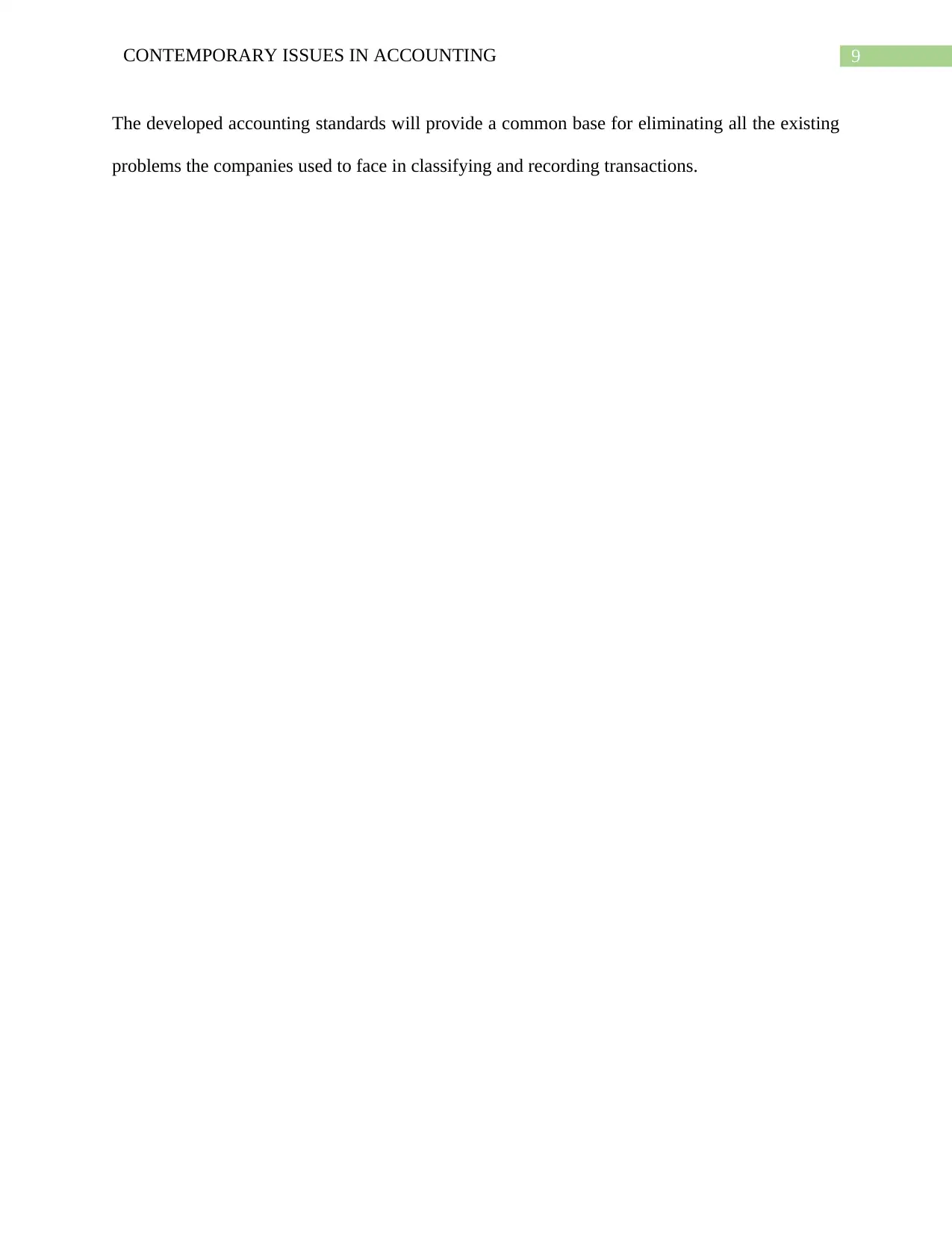
9CONTEMPORARY ISSUES IN ACCOUNTING
The developed accounting standards will provide a common base for eliminating all the existing
problems the companies used to face in classifying and recording transactions.
The developed accounting standards will provide a common base for eliminating all the existing
problems the companies used to face in classifying and recording transactions.
Paraphrase This Document
Need a fresh take? Get an instant paraphrase of this document with our AI Paraphraser
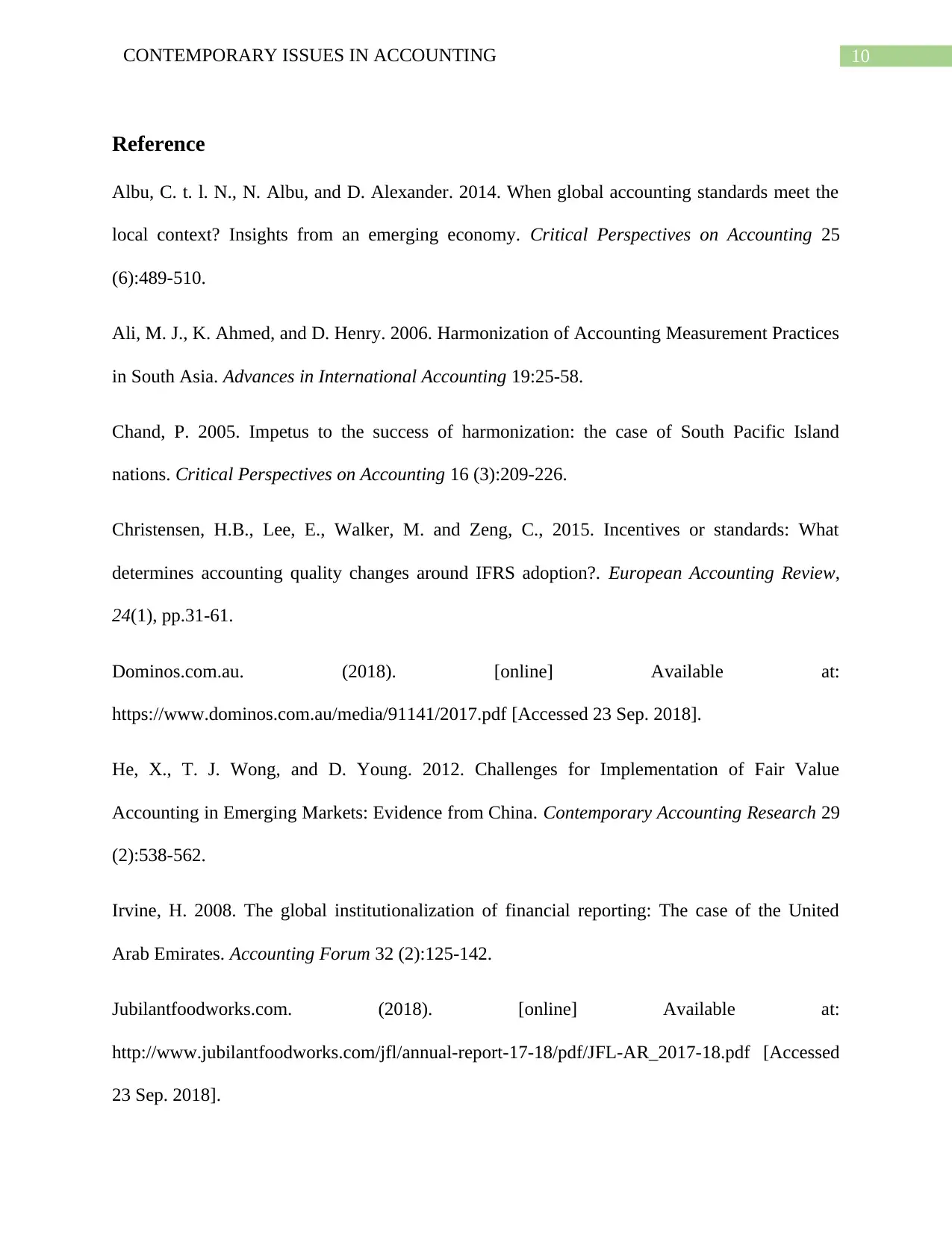
10CONTEMPORARY ISSUES IN ACCOUNTING
Reference
Albu, C. t. l. N., N. Albu, and D. Alexander. 2014. When global accounting standards meet the
local context? Insights from an emerging economy. Critical Perspectives on Accounting 25
(6):489-510.
Ali, M. J., K. Ahmed, and D. Henry. 2006. Harmonization of Accounting Measurement Practices
in South Asia. Advances in International Accounting 19:25-58.
Chand, P. 2005. Impetus to the success of harmonization: the case of South Pacific Island
nations. Critical Perspectives on Accounting 16 (3):209-226.
Christensen, H.B., Lee, E., Walker, M. and Zeng, C., 2015. Incentives or standards: What
determines accounting quality changes around IFRS adoption?. European Accounting Review,
24(1), pp.31-61.
Dominos.com.au. (2018). [online] Available at:
https://www.dominos.com.au/media/91141/2017.pdf [Accessed 23 Sep. 2018].
He, X., T. J. Wong, and D. Young. 2012. Challenges for Implementation of Fair Value
Accounting in Emerging Markets: Evidence from China. Contemporary Accounting Research 29
(2):538-562.
Irvine, H. 2008. The global institutionalization of financial reporting: The case of the United
Arab Emirates. Accounting Forum 32 (2):125-142.
Jubilantfoodworks.com. (2018). [online] Available at:
http://www.jubilantfoodworks.com/jfl/annual-report-17-18/pdf/JFL-AR_2017-18.pdf [Accessed
23 Sep. 2018].
Reference
Albu, C. t. l. N., N. Albu, and D. Alexander. 2014. When global accounting standards meet the
local context? Insights from an emerging economy. Critical Perspectives on Accounting 25
(6):489-510.
Ali, M. J., K. Ahmed, and D. Henry. 2006. Harmonization of Accounting Measurement Practices
in South Asia. Advances in International Accounting 19:25-58.
Chand, P. 2005. Impetus to the success of harmonization: the case of South Pacific Island
nations. Critical Perspectives on Accounting 16 (3):209-226.
Christensen, H.B., Lee, E., Walker, M. and Zeng, C., 2015. Incentives or standards: What
determines accounting quality changes around IFRS adoption?. European Accounting Review,
24(1), pp.31-61.
Dominos.com.au. (2018). [online] Available at:
https://www.dominos.com.au/media/91141/2017.pdf [Accessed 23 Sep. 2018].
He, X., T. J. Wong, and D. Young. 2012. Challenges for Implementation of Fair Value
Accounting in Emerging Markets: Evidence from China. Contemporary Accounting Research 29
(2):538-562.
Irvine, H. 2008. The global institutionalization of financial reporting: The case of the United
Arab Emirates. Accounting Forum 32 (2):125-142.
Jubilantfoodworks.com. (2018). [online] Available at:
http://www.jubilantfoodworks.com/jfl/annual-report-17-18/pdf/JFL-AR_2017-18.pdf [Accessed
23 Sep. 2018].
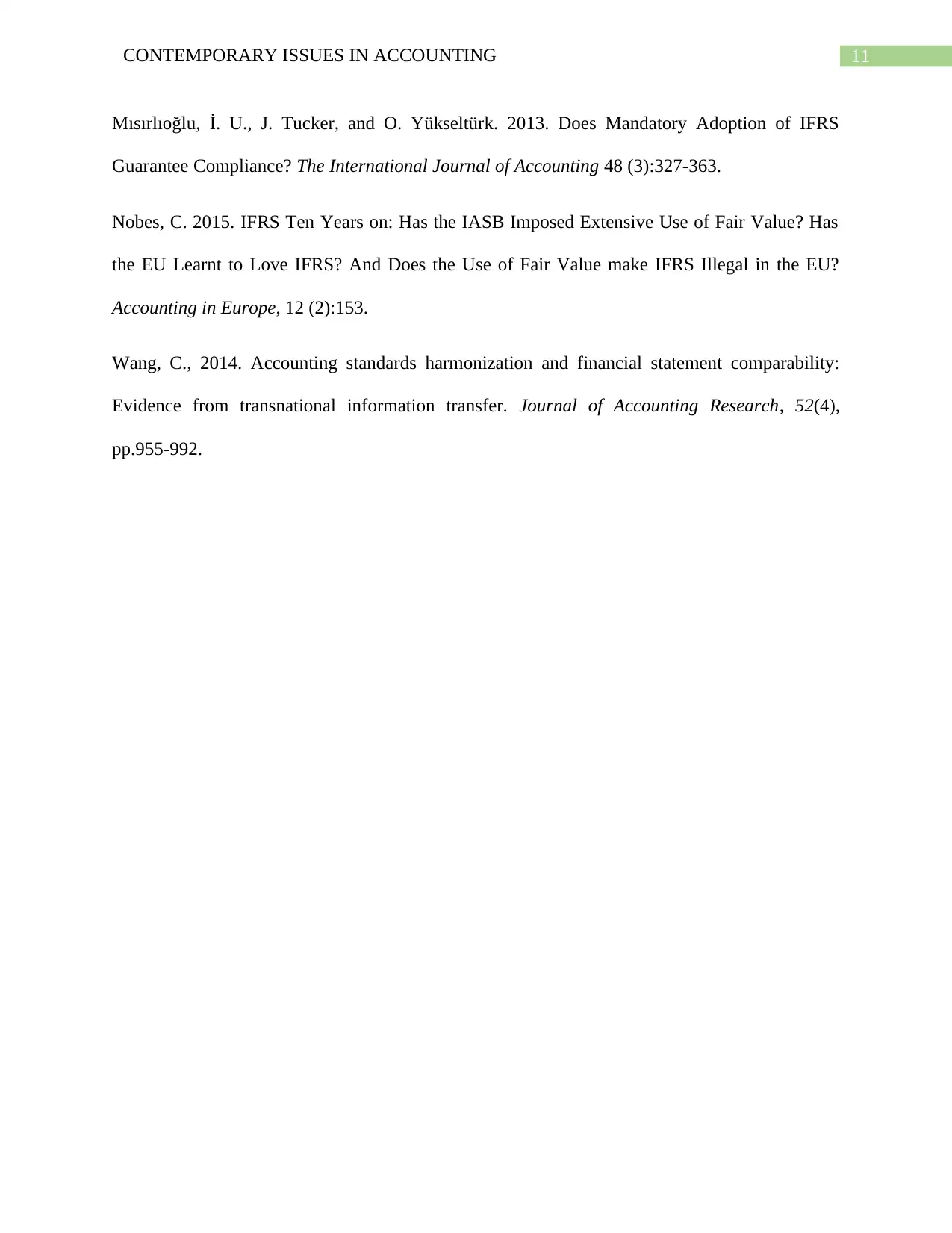
11CONTEMPORARY ISSUES IN ACCOUNTING
Mısırlıoğlu, İ. U., J. Tucker, and O. Yükseltürk. 2013. Does Mandatory Adoption of IFRS
Guarantee Compliance? The International Journal of Accounting 48 (3):327-363.
Nobes, C. 2015. IFRS Ten Years on: Has the IASB Imposed Extensive Use of Fair Value? Has
the EU Learnt to Love IFRS? And Does the Use of Fair Value make IFRS Illegal in the EU?
Accounting in Europe, 12 (2):153.
Wang, C., 2014. Accounting standards harmonization and financial statement comparability:
Evidence from transnational information transfer. Journal of Accounting Research, 52(4),
pp.955-992.
Mısırlıoğlu, İ. U., J. Tucker, and O. Yükseltürk. 2013. Does Mandatory Adoption of IFRS
Guarantee Compliance? The International Journal of Accounting 48 (3):327-363.
Nobes, C. 2015. IFRS Ten Years on: Has the IASB Imposed Extensive Use of Fair Value? Has
the EU Learnt to Love IFRS? And Does the Use of Fair Value make IFRS Illegal in the EU?
Accounting in Europe, 12 (2):153.
Wang, C., 2014. Accounting standards harmonization and financial statement comparability:
Evidence from transnational information transfer. Journal of Accounting Research, 52(4),
pp.955-992.
⊘ This is a preview!⊘
Do you want full access?
Subscribe today to unlock all pages.

Trusted by 1+ million students worldwide
1 out of 12
Related Documents
Your All-in-One AI-Powered Toolkit for Academic Success.
+13062052269
info@desklib.com
Available 24*7 on WhatsApp / Email
![[object Object]](/_next/static/media/star-bottom.7253800d.svg)
Unlock your academic potential
Copyright © 2020–2026 A2Z Services. All Rights Reserved. Developed and managed by ZUCOL.




